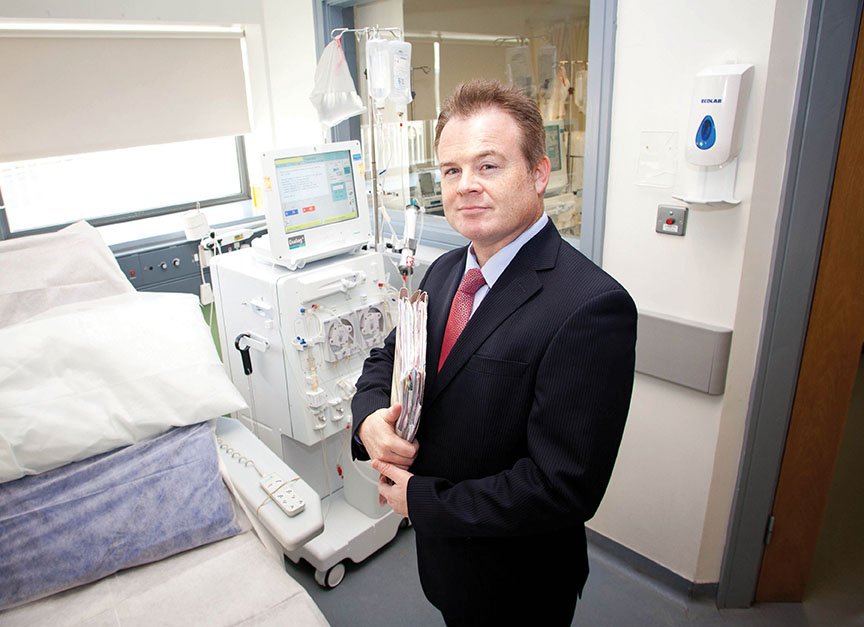Patients with gout are at increased risk of chronic kidney disease and kidney failure, according to recent University of Limerick-led research
In one of the largest and most detailed studies ever conducted, patients recruited in general practice with a diagnosis of gout were more than twice as likely to develop kidney failure than those without, according to the study led by researchers at University of Limerick’s (UL) Graduate Entry Medical School (GEMS).
The largest and most detailed study ever published on this subject used data from more than 620,000 patients in the UK health system.
It found that gout patients were also more likely to suffer a short-term deterioration in kidney function, as well as a sustained deterioration of function to less than 10 per cent of normal, compared to patients without gout.
The researchers based their findings on results of a large UK-wide study that analysed data from the Clinical Research Practice Data Datalink (CPRD), a research database that collects clinical information on patients attending primary care centres from across the UK.
In their analysis, researchers analysed the risk of advanced chronic kidney disease (CKD) in 68,897 gout patients followed for an average of 3.7 years and compared them to 554,964 patients without gout.
“The results were quite astonishing,” said Prof Austin Stack, Foundation Chair of Medicine at UL GEMS, who is lead author of the study and Principal Investigator for the UL Kidney Health Consortium at the Health Research Institute and Consultant Nephrologist at UL Hospitals.
“While we always believed that high levels of uric acid might be bad for kidneys and that patients with gout may have a higher risk of kidney failure, we were quite surprised by the magnitude of the risk imposed by gout in these patients. We were particularly interested in the risk of advanced kidney disease, as these patients in general have a higher risk of kidney failure and death.
“In our analysis, we defined advanced kidney disease based on four specific criteria: Need for dialysis or kidney transplant; failing kidney function to less than 10 per cent of normal; doubling of serum creatinine from baseline; and death associated with CKD.

“Overall, we discovered that patients who suffered from gout had a 29 per cent higher risk of advanced CKD compared to those without gout. Indeed when we analysed each of the components of advanced kidney disease, we found that in general, gout patients were at higher risk of a deterioration in kidney function compared to those without.
“Astonishingly, when we looked at the risk of kidney failure and those who needed dialysis or a kidney transplant, we found that gout patients had more than a 200 per cent higher risk of kidney failure than those without gout,” Prof Stack added of the study, which was published in BMJ Open.
The study sheds new light on the importance and potential impact of gout on kidney function. Although previous studies have shown that gout patients have a higher burden of kidney disease, none has convincingly shown that gout can contribute to the development of kidney failure.
“Our study had several important strengths that overcame the limitations of previous studies. It is one of the largest studies ever conducted, with over 620,000 patients included,” said Prof Stack.
“Second, the study was representative of patients that are typically seen in general practice within the UK health system. Third, the analysis accounted for known confounders — factors that may have contributed to the development of kidney disease, like hypertension and diabetes — and our findings were further confirmed in several additional analyses. Taken together, the findings from this study suggest that gout is an independent risk factor for progression of CKD and kidney failure.”
Each year, over 450 patients develop kidney failure in Ireland and require some form of dialysis treatment or a kidney transplant, explained Prof Stack.
“This continues to be the case, despite our best efforts at controlling blood pressure, diabetes and other well-established risk factors. In fact in over a decade, the numbers of patients who develop kidney failure in Ireland has increased from 2,848 in 2005 to 4,440 in 2017 (a growth of 56 per cent).
“The result of this new research suggests that gout may also play an important role in the progression of kidney disease. The identification of gout as a potential risk factor opens up new opportunities for the prevention of kidney disease and its consequences,” added Prof Stack.
The research was conducted in collaboration with researchers from OXON Epidemiology in the UK, and AstraZeneca in the UK and US.
The study, ‘Gout and the Risk of Advanced Chronic Kidney Disease in the UK Health System: A National Cohort Study’ is published by BMJ Open 2019 and authored by Austin G Stack, Michelle E Johnson, Betina T Blak, Alyssa B Klein, Lewis Carpenter, Robert Morlock, Andrew R Maguire and Vicky L Parsons.
Read the study online at: www.bmjopen.bmj.com/content/9/8/e031550.




